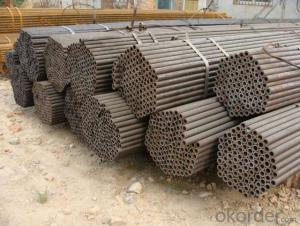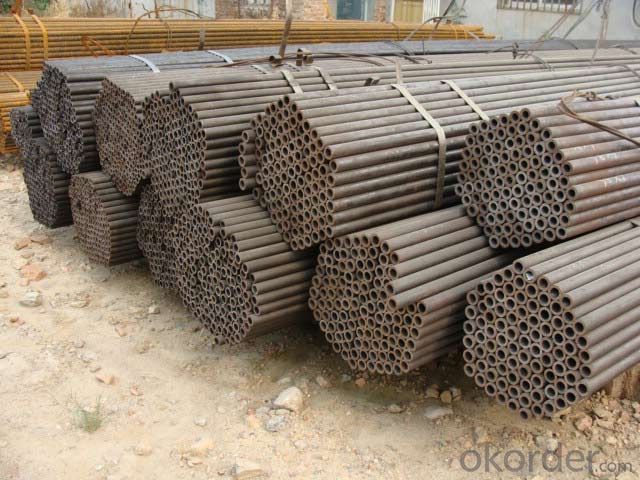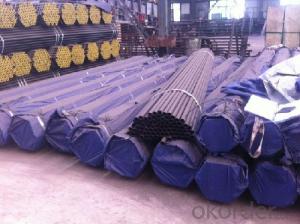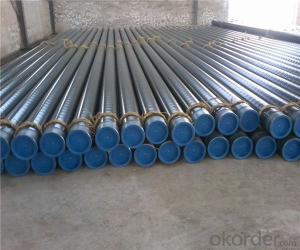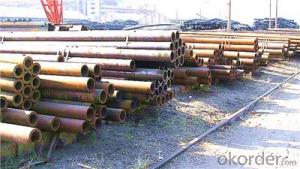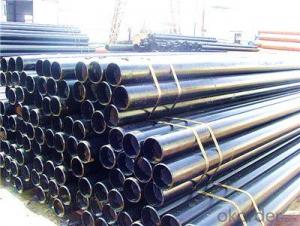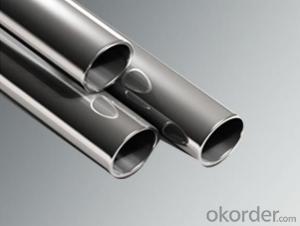The Seamless Steel Pipe of best Supplier
- Loading Port:
- Tianjin
- Payment Terms:
- TT OR LC
- Min Order Qty:
- 25 m.t.
- Supply Capability:
- 8000 m.t./month
OKorder Service Pledge
OKorder Financial Service
You Might Also Like
1、Structure of Seamless Pipe DIN1629/EN10216-1:
Seamless pipe is formed by drawing a solid billet over a piercing rod to create the hollow shell. As the manufacturing process does not include any welding, seamless pipes are perceived to be stronger and more reliable.
2、Main Features of the Seamless Pipe DIN1629/EN10216-1:
• High manufacturing accuracy
• High strength
• Strong heat dissipation ability
3、Seamless Pipe DIN1629/EN10216-1 Specification:
Standard | GB, DIN, ASTM ASTM A106-2006, ASTM A53-2007 |
Grade | 10#-45#, 16Mn 10#, 20#, 45#, 16Mn |
Thickness | 8 - 33 mm |
Section Shape | Round |
Outer Diameter | 133 - 219 mm |
Place of Origin | Shandong, China (Mainland) |
Secondary Or Not | Non-secondary |
Application | Hydraulic Pipe |
Technique | Cold Drawn |
Certification | API |
Surface Treatment | factory state or painted black |
Special Pipe | API Pipe |
Alloy Or Not | Non-alloy |
Length | 5-12M |
Outer Diameter | 21.3-610mm |
Grade | 20#, 45#, Q345, API J55, API K55, API L80, API N80, API P110, A53B |
Standard | ASME, ASTM |
1) Material:20#(ASTM A 106/A53 GRB.API5LGRB,GB),45#,16Mn,10#.
2) Specification range:OD:21.3-610mm,WT:6-70mm,length:6-12m or according to the requirement of clients.
3) Excutive standards:GB,ASME API5L.ASTM A 106/A53,Despite of the above standards,we can also supply seamless steel pipe with standard of DIN,JIS,and so on,and also develop new products according to the requirements of our clients!
4) Surface:black lacquered,varnish coating or galvanized.
4、Packaging & Delivery
Packaging Details: | seaworthy package,bundles wrapped with strong steel strip |
Delivery Detail: | 15-30days after received 30%TT |
5、FAQ of Seamless Pipe DIN1629/EN10216-1:
①How is the quality of your products?
Our products are manufactured strictly according to national and internaional standard, and we take a test
on every pipe before delivered out. If you want see our quality certifications and all kinds of testing report, please just ask us for it.
Guaranteed: If products’ quality don’t accord to discription as we give or the promise before you place order, we promise 100% refund.
②How about price?
Yes, we are factory and be able to give you lowest price below market one, and we have a policy that “ for saving time and absolutely honest business attitude, we quote as lowest as possible for any customer, and discount can be given according to quantity”,if you like bargain and factory price is not low enough as you think, just don’t waste your time.Please trust the quotation we would give you, it is professional one.
③Why should you chose us?
Chose happens because of quality, then price, We can give you both.Additionally, we can also offer professional products inquiry, products knowledge train(for agents), smooth goods delivery, exellent customer solution proposals.Our service formula: good quality+good price+good service=customer’s trust
SGS test is available, customer inspection before shipping is welcome, third party inspection is no problem.
6、Seamless Pipe DIN1629/EN10216-1 Images:
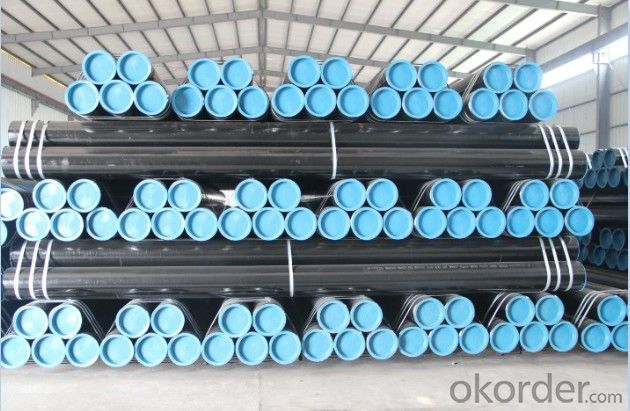
- Q: How are steel pipes protected against electrolytic corrosion?
- Steel pipes are protected against electrolytic corrosion through various methods such as applying protective coatings, using sacrificial anodes, implementing cathodic protection systems, or utilizing corrosion inhibitors. These measures help to prevent the flow of electric current and the subsequent corrosion caused by electrolysis, ensuring the longevity and integrity of the steel pipes.
- Q: Material of welded steel pipe
- GB/T3092-1993 (galvanized steel pipe for low pressure fluid delivery). Mainly used to transport water, gas, air, oil and heating, hot water or steam, etc. generally lower pressure fluid and other use tube. Its representative material is: Q235 grade a steel.GB/T14291-1992 (mine fluid conveying welded steel pipe). It is mainly used in mine pressure air, drainage and vertical seam gas welding pipe. Its representative material is Q235A, B grade steel.
- Q: How do you calculate the pipe volume flow rate for steel pipes?
- The pipe volume flow rate for steel pipes can be calculated using the formula: V = A * V_avg, where V is the volume flow rate, A is the cross-sectional area of the pipe, and V_avg is the average velocity of the fluid flowing through the pipe.
- Q: What is the tensile strength of steel pipes?
- The tensile strength of steel pipes can vary depending on the grade and type of steel used. However, in general, steel pipes have a high tensile strength. Typically, carbon steel pipes have a tensile strength range of 370 to 700 megapascals (MPa), while alloy steel pipes can have a tensile strength range of 770 to 1200 MPa. These high tensile strengths allow steel pipes to withstand high levels of pressure and stress, making them suitable for a wide range of applications such as in the construction, oil and gas, and automotive industries. It is important to note that the tensile strength of steel pipes can also be influenced by other factors such as the manufacturing process, heat treatment, and the presence of any defects or imperfections. Therefore, it is advisable to consult the specifications provided by the manufacturer or industry standards to determine the exact tensile strength of a specific steel pipe.
- Q: What are the alternatives to steel pipes for various applications?
- Some alternatives to steel pipes for various applications include PVC (polyvinyl chloride) pipes, copper pipes, aluminum pipes, and fiberglass pipes. Each alternative has its own advantages and disadvantages, such as cost, durability, and resistance to corrosion, which make them suitable for specific applications.
- Q: Can steel pipes be used for scaffolding?
- Yes, steel pipes can be used for scaffolding. Steel pipes are commonly used in scaffolding systems due to their strength, durability, and ability to support heavy loads. They provide a stable and secure platform for workers to perform construction and maintenance tasks at various heights.
- Q: How do you join steel pipes together?
- There are several methods to join steel pipes together. The most common methods include welding, threading, and using mechanical connectors. Welding involves melting the ends of the pipes and fusing them together, creating a strong and permanent joint. Threading involves cutting threads into the ends of the pipes and using threaded fittings to connect them. Mechanical connectors, such as couplings or flanges, use fasteners or compression to hold the pipes together. The choice of joining method depends on the specific application and the type of steel pipes being used.
- Q: How do steel pipes handle water hammer in high-rise buildings?
- Steel pipes in high-rise buildings handle water hammer by absorbing the sudden pressure surges caused by the rapid opening and closing of valves. The strong and durable nature of steel pipes allows them to withstand the impact of water hammer without experiencing significant damage or ruptures. Additionally, the flexibility of steel pipes helps to dissipate the kinetic energy generated by the water hammer, reducing the risk of pipe bursts and ensuring the smooth flow of water throughout the building.
- Q: How do steel pipes handle high-velocity flow?
- Steel pipes are highly capable of handling high-velocity flow due to their inherent strength and durability. The robustness of steel allows it to withstand the pressure exerted by the high-velocity flow, minimizing the risk of deformation or failure. Additionally, steel pipes have smooth interiors, which reduces frictional losses and ensures efficient flow rates even at high velocities.
- Q: What are the different types of steel pipe coatings for corrosive environments?
- There are several types of steel pipe coatings specifically designed for corrosive environments. Some common options include fusion-bonded epoxy (FBE) coatings, liquid epoxy coatings, polyethylene (PE) coatings, and polyurethane (PU) coatings. These coatings provide a protective layer to prevent corrosion and extend the lifespan of the steel pipes in various corrosive conditions.
Send your message to us
The Seamless Steel Pipe of best Supplier
- Loading Port:
- Tianjin
- Payment Terms:
- TT OR LC
- Min Order Qty:
- 25 m.t.
- Supply Capability:
- 8000 m.t./month
OKorder Service Pledge
OKorder Financial Service
Similar products
Hot products
Hot Searches
Related keywords
